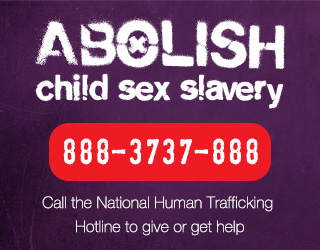Recognize the signs
Victims of trafficking (particularly children) are unlikely to identify themselves as such, or reach out for help. That’s why we all need to be able to recognize the covert signs of trafficking in order to help identify and rescue victims.There are some risk factors that make a child particularly vulnerable (although any child could be a potential victim of sex trafficking):
- Those involved in the child welfare or foster care systems
- Refugee and migrant children
- LGBTQ youth
- Homeless and runaway youth
- Children who have experienced prior abuse, sexual assault, or rape
- Children with unsupervised access to internet
NOTE: Any child (under 18) performing commercial sex acts is a victim of trafficking – regardless of the presence of force, fraud, or coercion, or whether they identify themselves as such. There is no such thing as a child prostitute.
Identify a child
A child who is being trafficked may:
Red Flags
- Show signs of physical abuse such as burn marks, bruises or cuts
- Appear malnourished; poor physical and/or dental health
- Have tattoos or branding, particularly related to money, ownership, and/or gang symbols
- Be in possession of large amounts of cash, multiple cell phones and/or hotel keys
- Miss school often, be overly tired at school, be out of school during school hours
- Be caught lying about age/with a false ID
- Avoid eye contact, social interaction, and authority figures/law enforcement
Closer Look
- Be constantly in the presence of a controlling/possessive boyfriend or girlfriend
- Be protective of and/or submissive to boyfriend/girlfriend
- Seem to adhere to scripted or rehearsed responses in social interaction
- Lack official identification documents
- Be unable or unwilling to give local address or information about parents/guardian
- Exhibit sudden changes in dress or behavior, particularly becoming more sexualized
- Behave withdrawn, depressed, distracted or checked out
- Have new friends with a different lifestyle
- Have a new boyfriend (especially older) who is jealous, controlling, violent, buys expensive gifts
- Show signs of gang affiliation
- Maintain sexually explicit profiles on social networking sites
Identify a trafficker
You might be more likely to interact directly with a trafficker than a victim. A person who is a trafficker or pimp may:
Red Flags
- Be significantly older than their female companions
- Act jealous, controlling and/or violent; not let companions speak for themselves
- Wear and own expensive items
Closer Look
- Encourage illegal activities and/or inappropriate sexual behavior
- Buy expensive gifts or own expensive items
- Be vague about his/her profession
- Be pushy or demanding about sex
- Promise things that seem too good to be true
(The risk factors, indicators, and signs of trafficking are complex and interconnected. Not all indicators listed above are present in every human trafficking situation, and the presence or absence of any of the indicators is not necessarily proof of human trafficking.)
Know the Risk Factors
Though it’s possible to encounter trafficking victims virtually anywhere in your day-to-day life, there are certain venues that carry higher risk. Community members should be on higher alert to trafficking instances when present at any of the following:
- Hotels and motels
- Airports/airplanes and busses
- Salons and massage parlors
- Courts and law enforcement agencies
- Emergency rooms
Certain industries and professions are uniquely positioned to encounter trafficking situations. If you are involved in one of these industries, take some time to view our information sheets: (COMING SOON!)
- Travel Industry
- Healthcare Industry
- Child Welfare System
- Schools
- Law Enforcement
Share with Others
The more community members that are educated on the issue, the more eyes we have that are able to recognize and respond to trafficking in our communities. Share this information with others!
Report suspected trafficking
If you suspect you are witnessing trafficking, do not intervene directly.
In case of emergency, dial 911.
In a non-immediate situation, call the National Human Trafficking Hotline: 1-888-3737-888 or text INFO or HELP to “BeFree” (233733).

International hotlines:
Mexico
Línea Ciudadana Contra la Extorsión
5533-5533 / 01 800 5533 000
United Kingdom
UK Modern Slavery Helpline and Resource Centre
08000 121 700 or info.mshelpline@unseenuk.org or http://www.modernslaveryhelpline.org/contact-us
Canada
The Canadian National Human Trafficking Hotline is http://www.canadianhumantraffickinghotline.ca/
In the meantime, local help is available 24/7: http://www.rcmp-grc.gc.ca/ht-tp/cont-eng.htm